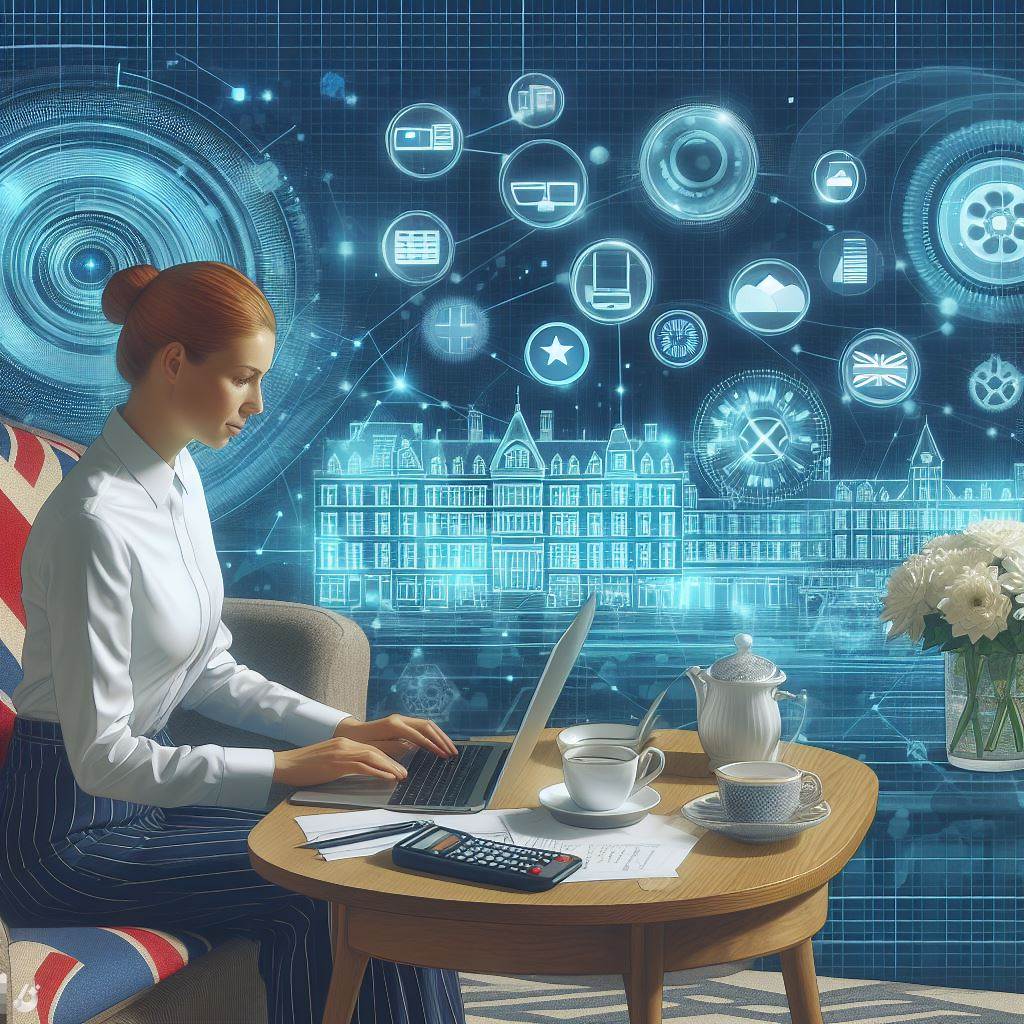Introduction
In the realm of UK hotel management, technology emerges as a pivotal force, reshaping operational landscapes and guest experiences.
The hospitality industry, a dynamic domain by nature, thrives on the seamless integration of cutting-edge technology.
From streamlined reservation systems to innovative guest services, the digital evolution redefines efficiency and elevates customer satisfaction.
In a tech-driven era, hotels harness the power of automation, data analytics, and artificial intelligence to optimize processes and anticipate guest needs.
The significance of technology in this sector extends beyond mere convenience; it has become a strategic imperative for staying competitive and meeting the evolving expectations of modern travelers.
As we delve into the intricacies of technology’s role in UK hotel management, we unravel a narrative where innovation becomes the cornerstone of success in the ever-evolving hospitality landscape.
The Evolution of Technology in UK Hotel Management
In recent years, technology has played a vital role in transforming UK hotel management.
From streamlining operations to enhancing guest experiences, hotels are leveraging advanced technological advancements to stay competitive in the evolving market.
1. Technology Advancements in the Hotel Industry
- Online Booking Systems: Hotel websites and third-party platforms have simplified the booking process.
- Mobile Apps: Hotels now have dedicated apps for guests to make reservations, access services, and provide feedback.
- Smart Room Systems: Guests can control room features like lighting, temperature, and entertainment through smart devices.
- Integrated Property Management Systems: Comprehensive software that automates various hotel operations.
- RFID Technology: Used for secure access control, tracking inventory, and enhancing overall security.
- Virtual Reality (VR): Hotels are utilizing VR to showcase rooms, amenities, and local attractions.
2. Transformative Technological Advancements
- Automated Check-In/Out: Digital kiosks and mobile check-in options minimize waiting time for guests.
- Self-Service Technologies: From self-checkout at restaurants to robot concierges, automation is gaining popularity.
- Artificial Intelligence (AI): AI-powered chatbots and virtual assistants provide instant guest support and enhance communication.
- Big Data Analytics: Hotels collect and analyze data to personalize guest experiences and improve operational efficiency.
- Internet of Things (IoT): Connected devices enable seamless communication between guests and hotel staff.
- Cloud Computing: Storage and accessibility of guest information and operational data anytime, anywhere.
3. Enhancing Guest Experiences and Operational Efficiency
Technology has significantly impacted guest experiences in UK hotels.
Personalization has become easier with the availability of guest data, allowing hotels to tailor services to individual preferences.
Operational efficiency has also improved.
Online booking systems and integrated property management software ensure accurate and real-time updates on room availability, pricing, and reservations.
This automation reduces human errors and enhances efficiency.
Technology has also revolutionized communication between hotel staff and guests.
Mobile apps and in-room devices allow guests to directly request services, provide feedback, and seek recommendations, resulting in faster response times and improved satisfaction.
Furthermore, technological advancements have streamlined back-end operations.
From inventory management to housekeeping scheduling, hotels can optimize resources and reduce costs.
The adoption of technology has also led to improved sustainability practices. For example, energy management systems and smart sensors help hotels reduce energy consumption and minimize waste.
Overall, technology has become an indispensable asset for UK hotels, transforming the way they operate and enhancing the guest experience.
However, it is essential to strike a balance between relying on technology and maintaining the personal touch that makes a hotel stay memorable.
In fact, the evolution of technology in UK hotel management has been remarkable.
The advancements have revolutionized various aspects of hotel operations and guest experiences.
It is crucial for hotels to embrace these technological developments to remain competitive in the dynamic hospitality industry.
Read: The Impact of Tech on UK Waitstaff Roles
Technological Innovations in UK Hotel Management
As the UK hospitality industry continues to evolve, hotel management has increasingly embraced technological innovations to enhance the guest experience.
From smart room technology to mobile apps, these advancements have revolutionized the way hotels operate.
Exploring Technological Innovations in UK Hotels
UK hotels have become pioneers in integrating technology into their operations, creating a seamless and personalized guest experience.
Some of the specific technological innovations being used include:
- Smart Room Technology: The implementation of voice assistants and smart controls in hotel rooms has become increasingly common.
Guests can control room temperature, lighting, and access hotel services with just their voice. - Internet of Things (IoT): UK hotels have started leveraging IoT devices to automate various tasks, such as controlling energy usage, monitoring guest preferences, and tracking room availability.
- Mobile Apps for Bookings and Check-Ins: Many hotels now offer mobile apps that allow guests to book rooms, check-in remotely, and access keyless entry to their rooms.
This has simplified the check-in process and eliminated the need for physical keycards. - Virtual Reality (VR) and Augmented Reality (AR): Some UK hotels are utilizing VR and AR technologies to offer virtual tours of their facilities, allowing guests to explore rooms and amenities before making a booking decision.
- Artificial Intelligence (AI) in Customer Service: AI-powered chatbots are being employed by hotels to provide instant customer support.
These chatbots can handle basic inquiries, make recommendations, and even assist with room service orders.
Implementing Smart Room Technology
One of the most significant technological innovations in UK hotel management is the implementation of smart room technology.
By incorporating voice assistants and smart controls, guests can enjoy a highly personalized and convenient stay.
Voice assistants, such as Amazon’s Alexa or Google Assistant, are integrated into hotel room devices, allowing guests to control various functions simply by speaking commands.
With voice commands, guests can adjust the room temperature, control lighting settings, request room service, or even ask for local restaurant recommendations.
Moreover, smart controls enable guests to manage their entire room experience through a centralized system.
From a single device or an app on their mobile phone, guests can control all aspects of their room, including temperature, entertainment systems, curtains, and even access to hotel amenities or services.
Personalized UK Career Consulting
Receive tailored career guidance designed just for you. Get actionable steps and expert support to boost your career in 1-3 days. Take control of your career now.
Get StartedThe Rise of Mobile Apps in Hotel Services
Mobile apps have transformed the way guests interact with hotels, offering a range of services conveniently accessible at their fingertips.
The use of mobile apps has become increasingly prevalent in UK hotel management, providing benefits for both guests and hotel operators.
For guests, mobile apps offer a streamlined booking process, allowing them to search for available rooms, compare prices, and make reservations in just a few taps.
Additionally, mobile apps enable pre-check-in, eliminating waiting times at the reception desk and providing a seamless arrival experience.
Once checked-in, guests can continue to utilize the app for a variety of services.
They can request amenities, order room service, schedule housekeeping, and even access information about nearby attractions and local events.
Mobile apps also facilitate communication with hotel staff, making it easy for guests to make special requests or report any issues during their stay.
The role of technology in UK hotel management has been transformative, enhancing the guest experience and optimizing hotel operations.
With the implementation of smart room technology and mobile apps, hotels have succeeded in providing personalized services and greater convenience to their guests.
As technology continues to advance, there is no doubt that the UK hospitality industry will continue to embrace innovative solutions to stay ahead in the competitive market.
Read: UK Etiquette: A Waitstaff’s Perspective
Benefits of Technology in UK Hotel Management
In today’s technological era, the role of technology in UK hotel management cannot be overstated.
It plays a vital role in enhancing customer satisfaction and guest experiences, providing convenience through online booking systems and mobile apps, and streamlining operations to improve efficiency and reduce costs.
Enhancing Customer Satisfaction and Guest Experiences
- Personalized Experiences: Technology allows hotels to collect and analyze guest data, enabling them to provide personalized experiences and tailor services to each individual.
- Smart Room Features: From voice-activated assistants to smart TVs and automated temperature control, technology enhances the comfort and convenience of guests during their stay.
- Efficient Communication: Hotels now utilize messaging apps and chatbots to facilitate real-time communication with guests, ensuring their needs are promptly addressed.
- Online Reviews and Feedback: Guests can easily share their experiences through online reviews and feedback platforms, allowing hotels to continuously improve their services and exceed customer expectations.
Convenience Offered by Online Booking Systems and Mobile Apps
- 24/7 Accessibility: Online booking systems and mobile apps allow customers to make reservations at any time, providing them with the convenience of booking from their preferred device.
- Instant Confirmation: Through these platforms, guests receive immediate confirmation of their reservations, reducing uncertainty and enhancing peace of mind.
- Real-Time Information: Hotels can update room availability, rates, and promotional offers in real-time, ensuring guests have access to the most up-to-date information.
- Cross-Selling Opportunities: Technology enables hotels to promote additional services and amenities during the booking process, increasing revenue through cross-selling.
Streamlining Operations, Improving Efficiency, and Reducing Costs
- Automation of Tasks: Technology automates various manual tasks such as check-in/check-out procedures, room service requests, and billing processes, freeing up staff time.
- Inventory Management: Advanced software systems help hotels optimize inventory management, leading to better stock control and reduced wastage.
- Data Analytics: Technology allows hotels to gather and analyze data on customer preferences, occupancy rates, and booking patterns, enabling them to make data-driven decisions for effective resource allocation.
- Energy Efficiency: Technology enables hotels to monitor and manage energy consumption, leading to significant cost savings and a reduced environmental impact.
In review, technology plays a pivotal role in UK hotel management, offering numerous benefits.
It enhances customer satisfaction and guest experiences by providing personalized services, smart room features, and efficient communication channels.
Online booking systems and mobile apps bring convenience through 24/7 accessibility, instant confirmation, and real-time information.
Additionally, technology streamlines operations, improves efficiency, and reduces costs through task automation, inventory management, data analytics, and energy efficiency measures.
By embracing technology, hotels can stay competitive and ensure a seamless experience for their guests.
Read: Career Growth for Waitstaff in the UK Hospitality

Challenges and Limitations of Technology in UK Hotel Management
Challenges that arise with the implementation of technology in hotels
- Integration of technology systems can be complex and result in technical glitches.
- Upgrading outdated infrastructure to support new technology can be costly.
- Compatibility issues may arise between different technologies and software.
- Training staff to use new technology can be time-consuming and challenging.
- Resistance to change from both staff and guests can hinder the successful implementation of technology.
Potential issues with data security and privacy
- Hotels must ensure the protection of guest data from cybersecurity threats.
- Data breaches can lead to reputational damage and legal consequences for hotels.
- Compliance with data protection regulations, such as GDPR, is crucial.
- Collecting and storing personal data requires implementing robust security measures.
- Misuse of guest data by hotel staff or third parties can breach privacy regulations.
Need for staff training and the resistance to technology adoption
Technology offers numerous advantages in the management of UK hotels, but it also comes with challenges and limitations.
One significant challenge is the integration of various technology systems, which can be complex and result in technical glitches.
Hoteliers must also consider the cost of upgrading infrastructure to support new technology, as older systems may not be compatible.
Ensuring compatibility between different technologies and software is crucial to avoid further complications.
Another challenge arises in training staff to use new technology.
This can be time-consuming and challenging, particularly for employees who may not be technologically inclined.
Resistance to change, both from staff and guests, can hinder the successful implementation of technology.
Staff may fear job displacement or lack the necessary digital literacy skills to adopt new technology.
Overcoming this resistance requires ongoing training and support, as well as effective communication about the benefits that technology brings to the hotel industry.
Data security and privacy pose additional concerns for hotels implementing technology.
Protection of guest data from cybersecurity threats is paramount, as data breaches can lead to reputational damage and legal consequences.
Compliance with data protection regulations, such as GDPR, is crucial.
Hotels must invest in robust security measures to collect and store personal data securely.
Any misuse of guest data by hotel staff or third parties can breach privacy regulations, resulting in severe penalties.
Despite these challenges, technology offers numerous benefits to hotel management in the UK.
It streamlines operations, improves guest experiences, and enhances overall efficiency.
However, understanding and addressing the limitations and challenges associated with technology implementation is vital for successful integration.
By investing in staff training and support, ensuring data security, and effectively communicating the advantages of technology, hotels can overcome these challenges and harness its full potential.
Read: UK Hotel Management: Skills and Duties
Discover More: Innovative Tour Packages by UK Operators
Your Dream Job Starts with a Perfect CV
Get a tailored CV and cover letter that captures your unique strengths and stands out in your industry. Let us help you make an unforgettable first impression.
Get StartedFuture Trends in Technology for UK Hotel Management
In today’s rapidly evolving world, technology plays a crucial role in every industry, including hotel management.
As the UK hotel industry strives to stay ahead of the competition and provide exceptional guest experiences, it is crucial to delve into the future trends in technology that will revolutionize the sector.
Potential use of artificial intelligence and machine learning
One of the most significant technological advancements on the horizon for UK hotel management is the integration of artificial intelligence (AI) and machine learning (ML) into various operational aspects.
AI and ML have the potential to automate processes, enhance efficiency, and streamline operations.
With AI and ML, hotels can utilize chatbots for personalized customer service, enabling guests to seek assistance and make reservations effortlessly.
These intelligent chatbots can analyze data to provide tailored recommendations and respond to inquiries promptly, enhancing guest satisfaction.
Besides chatbots, AI-powered revenue management systems can optimize pricing strategies based on numerous variables, such as demand, seasonality, and market trends.
By leveraging AI algorithms, hotels can maximize revenue by offering dynamic pricing and personalized offers.
Machine learning algorithms can also assist in predictive maintenance, enabling hotels to anticipate and address maintenance issues before they negatively impact guests’ experience.
Preventive maintenance results in improved guest satisfaction, reduced operational costs, and decreased downtime due to unexpected breakdowns.
Innovative technologies like virtual reality for immersive guest experiences
In addition to AI and ML, virtual reality (VR) is gaining traction in the hotel industry as an innovative technology to provide immersive guest experiences.
Hotels can use VR to showcase their rooms, facilities, and even local attractions before guests make a booking.
By allowing potential guests to virtually tour their accommodations and experience different amenities, hotels can create a more engaging and persuasive booking process.
VR can transport guests to their desired destination, allowing them to make informed decisions and have realistic expectations.
Moreover, VR can be utilized for virtual meetings and conferences, enabling hoteliers to host events without physical restrictions.
This technology opens up new revenue streams and provides opportunities for remote collaboration and networking without geographical limitations.
Another emerging trend is the Internet of Things (IoT), which connects various devices and systems to create a networked environment.
In hotels, IoT can enable automation and enhance guest experiences through personalized controls and services.
For instance, guests can use their smartphones to control room temperature, lighting, and entertainment systems.
IoT can also facilitate predictive inventory management by monitoring supplies and restocking them automatically when necessary.
Furthermore, IoT can contribute to energy management by optimizing energy consumption based on occupancy levels, thereby reducing environmental footprints.
This commitment to sustainability aligns with the ever-growing demand for eco-friendly practices among guests.
Upcoming technological trends that will impact the hotel industry
The future of UK hotel management lies in leveraging advanced technologies to create personalized and immersive experiences for guests.
From AI and ML-driven automation to VR for virtual tours, hotels must embrace these trends to stay competitive and redefine customer satisfaction.
As technology continues to evolve at a rapid pace, it is imperative for hotel managers to embrace these future trends and adapt their operations accordingly.
By utilizing innovative technologies and delivering exceptional guest experiences, UK hotels can thrive in the digital era.
Conclusion
Technology plays a crucial role in UK hotel management.
It has become an essential tool for improving operations, enhancing customer experience, and increasing overall efficiency.
The integration of technology has allowed hotels to streamline processes, such as online bookings and check-ins, automated room service, and personalized guest preferences.
Optimize Your LinkedIn for Success
Boost your LinkedIn profile with a professional bio, keyword-rich headline, and strategic recommendations that attract recruiters. Stand out from the crowd and get noticed.
Optimize NowContinuous adaptation and integration of technology are vital in the ever-evolving hotel industry.
With the constant advancements in technology, hotels must stay up to date to remain competitive and meet the changing needs and expectations of their guests.
This includes implementing innovative solutions like artificial intelligence, Internet of Things, and data analytics to gain valuable insights and tailor services accordingly.
The future of technology in enhancing hotel management in the UK looks promising.
As technology continues to advance, there will be even more opportunities to provide personalized and seamless guest experiences.
With the use of smart devices, mobile apps, and virtual reality, hotels can create unique and immersive experiences that will set them apart from their competitors.
It is essential for hotel managers and staff to embrace technology and continuously learn and adapt to the latest trends and innovations.
By doing so, hotels can enhance their operations, optimize their resources, and ultimately improve guest satisfaction.
Technology should be seen as an enabler rather than a threat, as it has the potential to revolutionize the hotel industry and create new and exciting possibilities for hotel management in the UK.
[E-Book for Sale]
500 Cutting-Edge Tech Startup Ideas for 2024 & 2025: Innovate, Create, Dominate
$19.99 • 500 Tech Startup Ideas • 62 pages
You will get inspired with 500 innovative tech startup ideas for 2024 and 2025, complete with concise descriptions to help you kickstart your entrepreneurial journey in AI, Blockchain, IoT, Fintech, and AR/VR.




